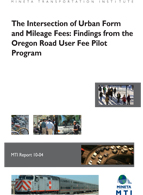- 408-924-7560
- mineta-institute@sjsu.edu
- Donate
The Intersection of Urban Form and Mileage Fees: Findings from the Oregon Road User Fee Pilot Program
This report analyzes data from the 2006-2007 Oregon Road User Fee Pilot program to assess if and how urban form variables correlate with travel behavior changes that participants made in response to the mileage-based fee program. It finds that charging a noticeably higher fee for driving in congested conditions can successfully motivate households to reduce their VMT in those times and places where congestion is most a problem. Households in both traditional (mixed use, dense, transit-accessible) and suburban (single-use, low density) neighborhoods will likely reduce their peak-hour and overall travel under a charging scheme that charges a high-rate for peak-hour travel, though households in the traditional neighborhoods will do so more.
It also finds that a mileage fee program that charges a high rate during the peak hour is likely to strengthen the underlying influence of urban form on travel behavior. In other words, land use probably will matter more to transportation planning if the nation shifts to a new paradigm of mileage-based financing and pricing system. For transportation policy-makers, this raises another layer of consideration when designing the optimal rate structure to achieve policy goals—either reduced VMT and congestion or sustained funding sources. For urban planners, this offers a wonderful opportunity to move towards a sustainable built environment through revised and compatible land use regulation under the context of a mileage-based fee.
The research also reveals that program design could significantly affect a household’s response to a mileage-based fee program. Particularly in Portland, the establishment of an endowment account for participants actually increased household VMT when a flat-rate fee was charged, the opposite to policy-makers’ expectation. One possible explanation is that paying the mileage-based fees once a month, instead of paying the gas tax at each visit to the pump, may have encouraged households to drive more due to the reduced gas price at the pump.
ZHAN GUO, PhD
Zhan Guo is Assistant Professor of Urban Planning and Transportation Policy at New York University. His research has focused on two interesting and interconnected questions: First, how does the governmental regulation over the built environment (e.g. land use planning and infrastructure investment) limit travel options and encourage one particular travel means—car driving? Second, how do travelers perceive different travel options? Could we reinforce, change, or even deceive that perception in order to promote the “right” behavior. Within this framework, He has conducted empirical studies on pedestrian behavior, public transit, and transportation and land use in Boston, Chicago, London, and New York City. He has an MCP (2003) and a PhD in Urban Studies and Planning (2008), both from Massachusetts Institute of Technology.
ASHA WEINSTEIN AGRAWAL, PhD
Asha Weinstein Agrawal is Associate Professor in the Department of Urban and Regional Planning at San José State University, and also Director of the MTI National Transportation Finance Center. Her research interests in transportation policy and planning include transportation finance, pedestrian planning, and urban street design. She also works in the area of planning and transportation history. She has a BA from Harvard University, an MURP from the London School of Economics and Political Science, and a PhD from the University of California at Berkeley. For a complete listing of her publications, see http://www.sjsu.edu/faculty/weinstein.agrawal/.
JENNIFER DILL, PhD
Jennifer Dill is Associate Professor in the Nohad A. Toulan School of Urban Studies and Planning at Portland State University and Director of the Oregon Transportation Research and Education Consortium (OTREC), a national university transportation center. Dr. Dill has a PhD in City and Regional Planning from UC Berkeley, an MA in Urban Planning from UCLA, and a BS in Environmental Policy Analysis and Planning from UC Davis. She teaches courses in transportation policy and urban planning methods. Dr. Dill’s research interests include the relationship between transportation policy and planning and land use, health, and the environment, travel behavior, and transportation finance. Her research is published in peer-reviewed journals, including Transportation Research, Transport Policy, and Transportation Research Record, along with several book chapters and research reports. Dr. Dill serves at the Chair of the Transportation Research Board’s Committee on Bicycle Transportation, and on two NCHRP panels. Prior to entering academia, Dr. Dill worked as an environmental and transportation planner for the Bay Area Air Quality Management District and US Environmental Protection Agency in San Francisco, CA. She was also research director at the Local Government Commission, where she worked on energy, land use, and transportation planning issues.
MEGAN QUIRK
Megan Quirk is a graduate student at New York University’s Wagner School of Public Service. Her study interests include alternative modes of transportation, street design, and smart growth. Prior to Wagner, she spent several years working in book publishing as a nonfiction editor. She received her BA in Economics from Smith College.
MESLISSA REESE
Melissa Reese is a candidate for a Masters of Urban Planning, with an international specialization, at New York University’s Wagner School of Public Service. She received her Bachelors of Urban and Environmental Planning from the University of Virginia in 2009. Her professional interest include GIS applications for urban planning domestically, participatory applications of GIS in less developed countries, and land tenure issues in informal settlements abroad.
-
Contact Us
San José State University One Washington Square, San Jose, CA 95192 Phone: 408-924-7560 Email: mineta-institute@sjsu.edu






